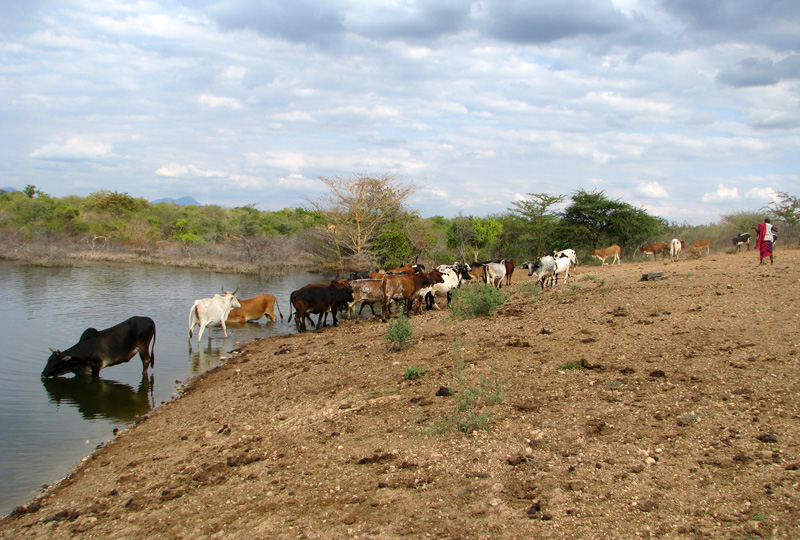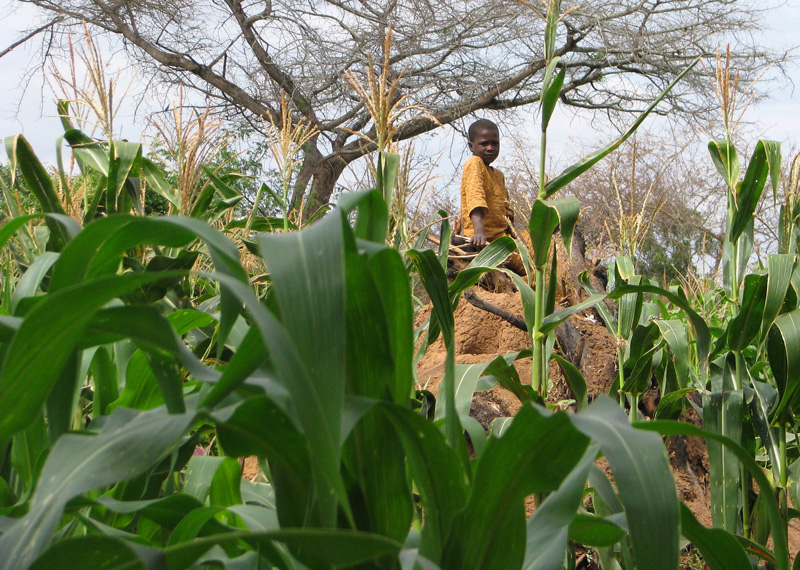-
Kirya: How a Village in Tanzania Shows the Challenge of Just Climate Adaptation
January 21, 2014 By Elizabeth Edna WanguiIn many parts of the world, climate change exacerbates existing inequalities – between men and women, rich and poor, landed and landless. Climate change responses, therefore, should carefully address these forms of vulnerability.
We hear this often, but in practice, it can be difficult to do.
The interaction of national climate policies with local dynamics is a theme I have encountered repeatedly in my research on how gender influences people’s capacity to adapt to climate variability and change in East Africa’s arid and semi-arid lands. Despite trends towards more diversification in rural livelihoods, farming remains important in these areas. Land and water are critical to the ability of families to respond to climate-related stress. As one might expect, climate change sometimes exacerbates existing tensions surrounding access to these critical natural resources. Less expected is that adaptation policies and related development interventions sometimes exacerbate these tensions as well.
Elizabeth Edna Wangui on gender and the changing nature of African pastoralism I have spent almost a decade studying community-based adaptations to climate change, however it was while attending two workshops co-sponsored by the Wilson Center, U.S. Department of State, USAID, and the Institute for Security Studies that I started to think critically about the intersection of climate change adaptation and conflict. The workshops, held in Washington, D.C., in 2012 and Addis Ababa in 2013, brought together scholars and practitioners from all over Africa and the United States to consider how best to approach climate change adaptation in the context of peacebuilding. I realized that peace and conflict were more entwined in my research than I previously thought, and this story, from the village of Kirya in northern Tanzania, is a good example of how.
Land Laws a Central Problem
Kirya is a dryland village in the Mwanga District of Kilimanjaro Region. Tanzania has a National Adaptation Program of Action (NAPA) that provides official country-wide adaptation priorities, and for the past four years, my colleagues and I have been studying how some of these priorities are playing out in reality. Tanzania’s NAPA includes a focus on agricultural development, and through related national policies such as Kilimo Kwanza (“agriculture first”), the government is encouraging agricultural transformation through modernization and commercialization. Other priorities include land reform and encouragement of foreign investment, some of which goes towards the expansion of irrigated agriculture in the drier parts of the country.
Many of the people of Kirya have likewise identified irrigated farming as an important strategy to help them adapt to increasing climatic variability and change. However, only about half of the people in the village benefit from irrigation. Many, especially women, are unable to access the land they would need to farm. Laws established in the aftermath of Tanzania’s economic liberalization in the late 1990s govern the land allocation process, a complex and locally contested procedure that in practice accords a higher priority to farmers (over pastoralists) and men (over women).
This creates tension on several fronts, as people struggle to adapt to changing conditions.
First, many of the longest-term residents of Kirya are Masai pastoralists, some of whom lay claim to relatively large (30 to 50 acres) tracts of grazing land critical to their way of life. Many of those working to establish irrigated farming are recent residents, who moved to the area when changing rainfall patterns made it more difficult for them to farm elsewhere. Expansion of irrigation has meant a loss of access to watering points along the river and riparian grazing for livestock. And the land allocation process tends to favor sedentary land use rather than herding, further squeezing the territory previously used by some of Kirya’s longest term residents.
Second, of those seeking land allocations for irrigation purposes, few are women and those that are face an uphill battle. For the most part, women are still expected to gain access to land through their male relatives. The problems posed by this arrangement are well documented. Many women do not understand the steps they need to follow, in part due to lack of education and literacy. For those that do make it through the process, they often end up with marginal tracts. Allocation to women began very recently, after almost all the land with easy access to water had already been assigned. Irrigating such farms requires additional inputs, such as water pumps and the gasoline to fuel them.
Pastoral women are the most disadvantaged. We found pastoral women are less likely to be literate and therefore less able to navigate the land allocation process. They also have fewer resources to seek recourse through the formal judicial system or informally contest seizures of their land. In extreme situations, pastoral women have been physically beaten and had their crops burnt in order to encourage them to vacate their plots. Those few pastoral women who do manage to gain access to land may not be able to irrigate it unless they first obtain permission from a male relative to sell livestock in order to purchase additional inputs. This permission is hard to come by, and the end result is few pastoral women taking advantage of irrigated farming.
One Story of Many
“Africa is a large continent,” said one participant from the first climate adaptation and peacebuilding workshop in 2012. “It is a story full of stories. Something can be true somewhere and not in other places.”
The dynamics at play in Kirya – from the village’s determined response to climate change to farmer-pastoralist tensions and the role of land laws and gender norms – is emblematic of how complex climate change adaptation can be at the local level. There are winners and losers, more vulnerable and less vulnerable to the changes affecting Tanzania. The rights of pastoralists hang in the balance, no more so than when it comes to women, while newer residents struggle to start over.
National adaptation policies are critical as it is one important scale where medium- and long-term planning can happen. However, local contexts can present barriers that prevent these plans from helping the most vulnerable, and, as in Kirya, may even provoke new tensions or conflict.
Sensitivity to existing inequalities, including gender, can help ensure that adaptation is both effective and discourages conflict, perhaps even helping to create peace where it doesn’t yet exist. But actually carrying out such flexible policies remains a challenge.
Elizabeth Edna Wangui is an associate professor in the Department of Geography at Ohio University. She is a member of the Local Knowledge and Climate Change Adaptation Project, funded by the National Science Foundation and made up of scholars from several American and Tanzanian institutions.
Sources: Tanzania National Business Council, UN Development Program, UN Economic Commission for Africa, UN Food and Agriculture Organization, United Republic of Tanzania Division of Environment.
Photo Credit: A Masai bringing his livestock to water at Lambo, and a young girl keeps livestock out of her grandparents’ field, used with permission courtesy of Elizabeth Edna Wangui.
 A Publication of the Stimson Center.
A Publication of the Stimson Center.





